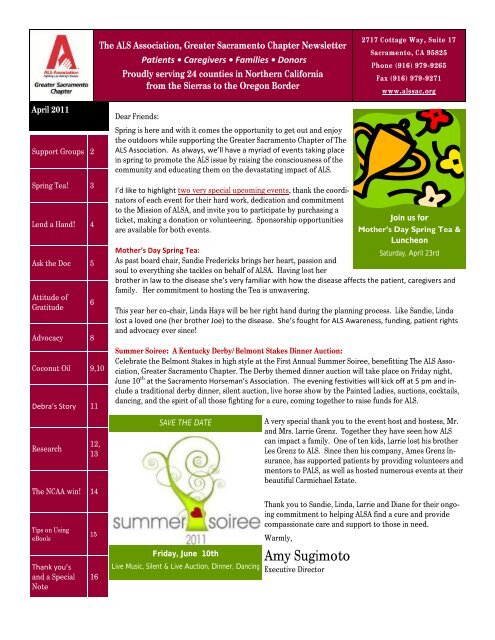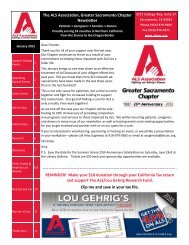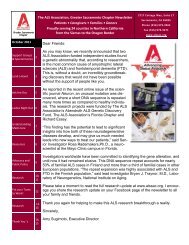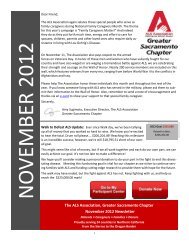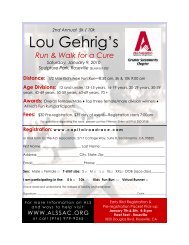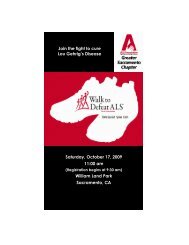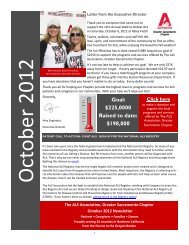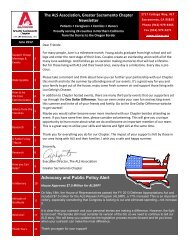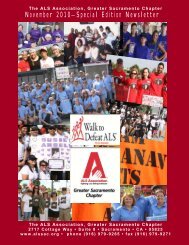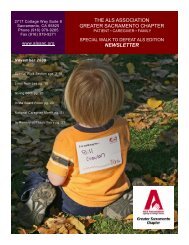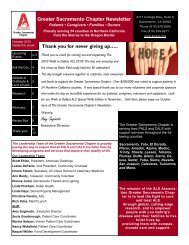April 2011 - The ALS Association Greater Sacramento
April 2011 - The ALS Association Greater Sacramento
April 2011 - The ALS Association Greater Sacramento
Create successful ePaper yourself
Turn your PDF publications into a flip-book with our unique Google optimized e-Paper software.
Advocacy 2717 Cottage Way, Suite 17<br />
<strong>The</strong> <strong>ALS</strong> <strong>Association</strong>, <strong>Greater</strong> <strong>Sacramento</strong> Chapter Newsletter<br />
Patients • Caregivers • Families • Donors<br />
Proudly serving 24 counties in Northern California<br />
from the Sierras to the Oregon Border<br />
<strong>Sacramento</strong>, CA 95825<br />
Phone (916) 979-9265<br />
Fax (916) 979-9271<br />
www.alssac.org<br />
<strong>April</strong> <strong>2011</strong><br />
Support Groups 2<br />
Spring Tea! 3<br />
Lend a Hand! 4<br />
Ask the Doc 5<br />
Attitude of<br />
Gratitude<br />
6<br />
Advocacy 8<br />
Coconut Oil 9,10<br />
Debra’s Story 11<br />
Research<br />
12,<br />
13<br />
<strong>The</strong> NCAA win! 14<br />
Tips on Using<br />
eBools<br />
Thank you’s<br />
and a Special<br />
Note<br />
15<br />
16<br />
Dear Friends:<br />
Spring is here and with it comes the opportunity to get out and enjoy<br />
the outdoors while supporting the <strong>Greater</strong> <strong>Sacramento</strong> Chapter of <strong>The</strong><br />
<strong>ALS</strong> <strong>Association</strong>. As always, we’ll have a myriad of events taking place<br />
in spring to promote the <strong>ALS</strong> issue by raising the consciousness of the<br />
community and educating them on the devastating impact of <strong>ALS</strong>.<br />
I’d like to highlight two very special upcoming events, thank the coordinators<br />
of each event for their hard work, dedication and commitment<br />
to the Mission of <strong>ALS</strong>A, and invite you to participate by purchasing a<br />
ticket, making a donation or volunteering. Sponsorship opportunities<br />
are available for both events.<br />
Mother’s Day Spring Tea:<br />
As past board chair, Sandie Fredericks brings her heart, passion and<br />
soul to everything she tackles on behalf of <strong>ALS</strong>A. Having lost her<br />
brother in law to the disease she’s very familiar with how the disease affects the patient, caregivers and<br />
family. Her commitment to hosting the Tea is unwavering.<br />
This year her co-chair, Linda Hays will be her right hand during the planning process. Like Sandie, Linda<br />
lost a loved one (her brother Joe) to the disease. She’s fought for <strong>ALS</strong> Awareness, funding, patient rights<br />
and advocacy ever since!<br />
Summer Soiree: A Kentucky Derby/Belmont Stakes Dinner Auction:<br />
Celebrate the Belmont Stakes in high style at the First Annual Summer Soiree, benefitting <strong>The</strong> <strong>ALS</strong> <strong>Association</strong>,<br />
<strong>Greater</strong> <strong>Sacramento</strong> Chapter. <strong>The</strong> Derby themed dinner auction will take place on Friday night,<br />
June 10 th at the <strong>Sacramento</strong> Horseman’s <strong>Association</strong>. <strong>The</strong> evening festivities will kick off at 5 pm and include<br />
a traditional derby dinner, silent auction, live horse show by the Painted Ladies, auctions, cocktails,<br />
dancing, and the spirit of all those fighting for a cure, coming together to raise funds for <strong>ALS</strong>.<br />
SAVE THE DATE<br />
Friday, June 10th<br />
Live Music, Silent & Live Auction, Dinner, Dancing<br />
A very special thank you to the event host and hostess, Mr.<br />
and Mrs. Larrie Grenz. Together they have seen how <strong>ALS</strong><br />
can impact a family. One of ten kids, Larrie lost his brother<br />
Les Grenz to <strong>ALS</strong>. Since then his company, Ames Grenz Insurance,<br />
has supported patients by providing volunteers and<br />
mentors to P<strong>ALS</strong>, as well as hosted numerous events at their<br />
beautiful Carmichael Estate.<br />
Thank you to Sandie, Linda, Larrie and Diane for their ongoing<br />
commitment to helping <strong>ALS</strong>A find a cure and provide<br />
compassionate care and support to those in need.<br />
Warmly,<br />
Amy Sugimoto<br />
Executive Director<br />
Join us for<br />
Mother’s Day Spring Tea &<br />
Luncheon<br />
Saturday, <strong>April</strong> 23rd
Page 2<br />
Advocacy<br />
Support Group Meetings<br />
S A C R A M EN T O ( D o w n t o w n )<br />
S u t t e r C a n c e r C e n t e r<br />
2 8 0 0 L S t r e e t<br />
S a c r a m e n t o , C A 9 5 8 1 6<br />
Saturday, <strong>April</strong> 16th<br />
Saturday, May 21st<br />
Saturday, June 18<br />
Saturday, July 16<br />
Saturday, August 20<br />
10:30am –12:30pm<br />
P<strong>ALS</strong> & C<strong>ALS</strong><br />
(Breakout Session)<br />
Snacks and Beverages are<br />
provided at no cost.<br />
Parking: Patients can be dropped off at<br />
the front of Sutter Cancer Center near<br />
the valet.<br />
If you are in need of financial assistance<br />
for parking, please let us know—<br />
reimbursements are available for P<strong>ALS</strong><br />
and C<strong>ALS</strong>.<br />
S A C R A M EN T O ( F u l t o n A v e )<br />
C a r lt on Plaza<br />
1 0 7 1 Fu lt on Ave.<br />
S a cr am en to , C A 9 58 2 5<br />
Thursday, <strong>April</strong> 14th<br />
Thursday, May 12th<br />
Thursday, June 9th<br />
Thursday, July 14th<br />
12-2 pm<br />
R E D D I N G<br />
A t t h e h o m e o f R o n a n d<br />
C a r o l S m i t h .<br />
A p r i l 2 8 t h<br />
12- 2 p m<br />
For more information on<br />
support groups in Redding,<br />
please contact<br />
Nancy Wakefield<br />
at (916) 979-9265<br />
STOCKTON<br />
Plymouth Square<br />
1319 North Street<br />
6th Floor Conference Room<br />
Stockton, CA 95202<br />
Thursday, <strong>April</strong> 7th<br />
Thursday, May 5th<br />
Thursday, June 2<br />
Thursday, July 7th<br />
Thursday, August<br />
10am—12pm<br />
P<strong>ALS</strong> & C<strong>ALS</strong><br />
Snacks and Beverages are provided<br />
at no cost.<br />
To RSVP or for more information<br />
please contact:<br />
Caryn Cochran-Branson, Patient<br />
Services Coordinator at (916) 979-<br />
9265 or ccochranbranson@alssac.org<br />
UPCOMING EVENTS:<br />
Saturday, <strong>April</strong> 9th—<strong>The</strong> Davis Film<br />
Festival (<strong>ALS</strong>, <strong>Sacramento</strong> Chapter is<br />
the beneficiary)<br />
Wednesday, <strong>April</strong> 13th—<strong>The</strong> Granite<br />
Bay High School Concert (<strong>ALS</strong>, <strong>Sacramento</strong><br />
Chapter is the beneficiary)<br />
Saturday, <strong>April</strong> 23th—Mother’s Day<br />
Spring Tea at Stockton Blvd. La Bou<br />
Saturday, May 14th—Rittman’s Ride<br />
(Motorcycle Run)<br />
Friday, June 10th —<br />
Summer Soiree: Celebrating the Kentucky<br />
Derby/ Belmont Stakes<br />
Sunday, June 12th—Bingo at the<br />
Oddfellows Hall in Davis, CA<br />
Friday, July 1st– Walk Kick Off at<br />
Raley Field<br />
Tuesday, August 9th—Cody’s Dinner<br />
in Winters, Ca.<br />
Thursday, September 1st -<br />
Ladies Night Out at the home of<br />
Diane Grenz<br />
Sunday, September 18th—<br />
Walk for a Cure, Sparks Marina Park<br />
Reno/ Sparks<br />
Saturday, October 1st—Walk to Defeat<br />
<strong>ALS</strong> @ Raley Field, West <strong>Sacramento</strong><br />
HELP WANTED—Special Event Volunteers<br />
<strong>The</strong> <strong>Greater</strong> <strong>Sacramento</strong> Chapter is seeking a volunteers to help with our spring event season. No experience<br />
needed, just the willingness to help and the kindness to give back—we ’ ll train you on the rest! If<br />
you ’ re interested in helping with any of the above events, please call our Chapter office at<br />
916-979-9265.
<strong>The</strong> motivation behind the Mother’s Day Tea<br />
PAGE 3<br />
Linda Hays joined the <strong>ALS</strong>A Board of Directors in 2010 as a result of wanting to channel<br />
her passion into finding a cure. Her brother Joe was born in <strong>April</strong> 1967. She was 19 at the<br />
time. Joe was the last of six children and there was 16 years difference in age to his nearest<br />
sibling. Linda often dressed and fed Joe as he was less than two years older than her<br />
oldest son.<br />
In 2006, during Christmas Linda’s family noticed that Joe seemed to be talking differently.<br />
He was always a quiet person and didn’t talk much, but it became obvious that something<br />
was wrong. Joe made an appointment with his doctor who in turn sent him to an ear,<br />
nose and throat specialist. From there he went on to Forbes Norris Research Center<br />
where he was officially diagnosed with <strong>ALS</strong> in June of 2007 by Dr. Robert Miller. Joe<br />
passed away in February of 2009 at the age of 41 years old.<br />
Linda continues to support the <strong>Greater</strong> <strong>Sacramento</strong> Chapter in Joe’s honor and enjoys<br />
volunteering at the support group meetings and at the Forbes Norris Satellite Clinic in <strong>Sacramento</strong>.<br />
She has a strong understanding of what it’s like to lose a loved one to <strong>ALS</strong> and the frustration and hardship<br />
caregivers endure while watching a loved one battle the disease.<br />
As Joe’s primary caregiver he eventually moved into our home. Joe did as much as he could on his own, but the disease<br />
took his body quickly. I lived for brightening Joe’s day and still look back and treasure the things we did together.<br />
Besides co-hosting this years Mother’s Day Spring Tea, Linda is a strong Advocate for <strong>ALS</strong> on a national and statewide<br />
level. She will join the <strong>Sacramento</strong> staff in DC for <strong>ALS</strong> Advocacy Day and help spread <strong>ALS</strong> awareness.<br />
A note from Sandie about the tea…..<br />
With spring time upon us; it is the time of year I find refreshing with new life, new birth, and<br />
beautiful flowers all around. I am also reminded of why this tea party happens every year. It<br />
really started as a way to remember my brother-in-law Paul and the many P<strong>ALS</strong> that are suffering<br />
with <strong>ALS</strong>, and to give back to the <strong>Sacramento</strong> Chapter who continue to be instrumental in supporting<br />
and helping bring quality of life to our P<strong>ALS</strong>. It was a way to help raise money to find a<br />
cure—you know one small step leads to a bigger step and bingo we have a cure.<br />
I have found that it has become a kind of healing for me and an opportunity to bring people together<br />
to relax, a moment of loveliness to enjoy each other – A cup of tea!<br />
Sandie Fredericks, past Board Chair<br />
Thank you to LaBou Café for hosting<br />
our venue for the upcoming Spring<br />
Tea. 2248 Stockton Blvd. <strong>Sacramento</strong>,<br />
CA 95817<br />
Mother’s Day<br />
Spring Tea & Luncheon<br />
Saturday, <strong>April</strong> 23rd<br />
Noon<br />
Special Presentations by:<br />
Dee Norris, Forbes Norris Research<br />
& Treatment Center<br />
Lee Jared, P<strong>ALS</strong><br />
Viki Spector, Village Hat Shop<br />
Entertainment:<br />
Bingo • Raffle • Hat contest<br />
Live music by Pam Pamperin<br />
Tickets$35 PP, P<strong>ALS</strong> $25. Call 916-979-9265 to reserve your<br />
ticket.
Lend a hand<br />
Page 4<br />
VOLUNTEERS WANTED:<br />
Office Help: If you have office and/or computer<br />
experience and would like to volunteer<br />
at our Chapter office, please contact<br />
Amy Sugimoto at the Chapter. Duties include:<br />
data entry, answering phones and<br />
photocopying.<br />
Driver: If you live in the Northern California<br />
area and would like to pick up or drop off<br />
loaned medical equipment to our P<strong>ALS</strong>, we<br />
are looking for help three to four days per<br />
month.<br />
Loan Closet Coordinator: call for details.<br />
Special Events: We need volunteers to help<br />
with event set up, clean up, silent auctions,<br />
guest services, and registration.<br />
Thank you to our current leadership for your VISION, VOLUNTEERISM, COM-<br />
PASSION AND SPIRIT in serving those impacted by <strong>ALS</strong>.<br />
Our Leadership Team for <strong>2011</strong><br />
Scott Ehlen, President, American Greetings<br />
Rich Kline, Financial Advisor, Morgan Stanley<br />
Cherie Felsch, Secretary, UC Davis School of Veterinary Medicine<br />
Dianne Jared, <strong>Sacramento</strong> <strong>The</strong>atre and Lighting<br />
Linda Hays, Sierra Property Management<br />
Steve Pereira, ADL<br />
Sandie Ferguson, Neurology / Sutter Neuroscience Institute<br />
Dr. Bjorn Oskarsson, UC Davis Department of Neurology<br />
Amy Sugimoto, Executive Director<br />
Staff:<br />
Nancy Wakefield, Patient Service Coordinator<br />
Caryn Cochran Branson, Patient Service Coordinator<br />
Alycia Cahill, Office Administrator<br />
Leslee DeFazio, Special Events Coordinator<br />
<strong>The</strong> Walk Kick Off is Friday, July 1st at Raley Field—Team<br />
Captains are eligible for two tickets to the game, a catered dinner<br />
in the Jackson Rancheria area and a wonderful display of fireworks!<br />
Make sure to register early to get a spot! You can register<br />
at http:/web.alsa.org/greatersacwalk. Thank you to the following<br />
3 teams for your early registration:<br />
Marlene’s Mob ♥ Cross/ Novo/ Moreno<br />
In Memory of Kathleen<br />
Your commitment to <strong>The</strong> Walk to Defeat <strong>ALS</strong>, <strong>Greater</strong> <strong>Sacramento</strong> Chapter allows us to serve P<strong>ALS</strong> and C<strong>ALS</strong> with support<br />
services throughout the following counties:<br />
<strong>Sacramento</strong>, Yolo, El Dorado, Placer, Amador, Alpine, Modoc, Trinity, Shasta, Lassen, Tehama, Plumas, Butte, Glenn,<br />
Sierra, Colusa, Sutter, Yuba, Siskiyou, Nevada, San Joaquin, Calaveras, Tuolumne, and Mono.
Ask the Doc Q & A with Edward Kasarskis, MD, PhD<br />
Page 5<br />
Edward Kasarskis, M.D., Ph.D. is Director of the multidisciplinary <strong>ALS</strong> Center at the University of Kentucky<br />
Neuroscience Center in Lexington, Kentucky, professor in the Department of Neurology at the<br />
University of Kentucky, and Chief of Neurology at the VA Medical Center in Lexington KY.<br />
Q: I find that I sometimes overreact to something I hear, read, or see on TV. Occasionally I start crying;<br />
other times I seem to laugh uncontrollably. Is this something other people with <strong>ALS</strong> experience,<br />
or might I have another medical problem? Is there anything I can do about this?<br />
A: It’s perfectly normal to experience happy or sad feelings when you have <strong>ALS</strong>, of course. But if you<br />
find yourself laughing or crying excessively, or if your family or friends feel you are over-reacting to Dr. Kasarskis<br />
situations with more emotion than you typically did, that could suggest a problem. It’s not uncommon for people with<br />
<strong>ALS</strong> to have what is called “pseudo bulbar affect” (PBA), which is the proper medical term for this set of symptoms.<br />
PBA can occur in people with many different neurologic conditions and is recognized by involuntary, sudden, and frequent<br />
episodes of laughing and/or crying far in excess of situation which may have provoked it. <strong>The</strong> outbursts can<br />
cause embarrassment and anxiety, particularly when you’re with others. People with PBA may find it difficult to hold<br />
down a job or interact in social situations, and may isolate themselves as a result. One <strong>ALS</strong> patient of mine with PBA<br />
found that he couldn't discipline his child because he burst out laughing at his son's mischievous antics.<br />
It’s common for people with PBA to wonder how the problem can possibly be related to <strong>ALS</strong>, but it is. <strong>The</strong> PBA appearances<br />
are nothing more than exaggerated reflexes, and are yet another hyperactive reflex that reflects the "Upper Motor<br />
Neuron" involvement in <strong>ALS</strong>. Not surprisingly, people with other conditions, such as multiple sclerosis, stroke, traumatic<br />
brain injury, and other neurologic problems can also exhibit PBA.<br />
For years, people with PBA have been treated with a variety of anti-depressants, with only limited success. <strong>The</strong>re is,<br />
however, a new drug, just approved by the FDA, called Nuedextra® -- a fixed dose combination of dextromethorphan<br />
hydrobromide and quinidine (not quinine) sulfate -- that is effective in reducing PBA symptoms. (In the spirit of full<br />
disclosure, the University of Kentucky participated in the evaluation of the drug as a clinical trial study site, but there is<br />
no other potential conflict of interest). Neudextra may be a useful medication for people who find their episodes of<br />
laughing or crying interfering with their activities of daily living and quality of life.<br />
I suggest you discuss your own personal situation with your physician. He or she will help you decide whether your<br />
symptoms are significant enough to warrant taking the medication (which is given twice a day), and if the potential<br />
benefits make the drug worthwhile for you.<br />
If you would like to submit questions for a future Q & A, please send your questions to Amber Walters at awalters@alsa-national.org.<br />
<strong>The</strong> future is in your hands.<br />
Dream with us.<br />
Few of us will actually change the<br />
course of history or write the great<br />
American novel. But a legacy gift to<br />
<strong>The</strong> <strong>ALS</strong><br />
<strong>Association</strong>, through your will or<br />
living trust, can help ensure that<br />
our shared dream of a world without<br />
<strong>ALS</strong> becomes a reality. Help us<br />
keep hope alive for those<br />
battling <strong>ALS</strong> by supporting our work<br />
to eradicate this devastating disease.<br />
Please contact <strong>The</strong> <strong>Greater</strong><br />
<strong>Sacramento</strong> Chapter for more information.
Attitude of Gratitude<br />
Page 6<br />
Living on Earth, Living with Mirth, time for Re-Birth by Cathy Speck<br />
I’m baffled, befuddled and operating with a teeny part of my brain.<br />
<strong>The</strong> rest of my brain is busy reminding me to breathe, hydrate,<br />
don’t lie down flat, and take my meds on schedule. I’m thrilled and<br />
honored to have the opportunity to use my literary skills. I get to<br />
die doing some of my favorite things. Sounds like a song. How<br />
ironic.<br />
My biggest concern I had after being diagnosed with <strong>ALS</strong> was losing<br />
the ability to talk, sing and perform. Well, that time is here, and<br />
I’m not dead yet. I can still speak, but go hoarse quickly. I might be<br />
able to eek out a song at a wedding or funeral, or castrating ceremony.<br />
I’d love to write something monthly, if I can keep up with the<br />
deadlines. We’ll take it one day a time. I could write about many<br />
facets of <strong>ALS</strong>, but these will be points of departure. From there,<br />
it’ll flow into dying death after death after life. Living on<br />
earth/living with mirth.<br />
Every column will be fun, funny and honest, bare, vulnerable and<br />
insightful. It’ll be rated “G” or “PG.”<br />
“Hey, Cathy Speck, what will you call the column? Macaroni?” How<br />
about: Speck Speaks — For Awhile.<br />
sports, or being a<br />
show-off and hollering,<br />
“Hey Mom!<br />
MOM! Watch me!”<br />
I was climbing the<br />
towering mulberry<br />
tree and jumping —<br />
while keeping my<br />
eagle eye on lookout<br />
duty for dog doodie.<br />
C<strong>ALS</strong> Linda Duval rockin’ with Mazie<br />
and Sky Serrani<br />
…<strong>The</strong> most common<br />
form of <strong>ALS</strong>, called<br />
Sporadic <strong>ALS</strong>, is estimated<br />
to be 90-95<br />
percent of the <strong>ALS</strong><br />
demographics. With<br />
large SOD1 families<br />
(like mine), researchers<br />
have a better chance at following the cells, nerves and proteins<br />
to gain more information about “what, when, why, how” the mutations<br />
are activated. This was huge breakthrough, but that was in<br />
1993. As you can guess, we need so much more money to keep the<br />
research going strong.<br />
as<br />
Ham I am, and in German, my last name, “Speck,” means bacon/ham.<br />
Did I just hear you yodeling, “old lady old lady heeee<br />
whoo, yoohoo old lady oh oh uuu lady I diddle jey de hoeo?”<br />
Which roughly translates to: “arrrrghhhh grrrrruffff,” or, “From<br />
Speck’s Vista Point Spot.” Or “Checking in With Chatty Cathy.”<br />
Please join me in striving to bring <strong>ALS</strong> awareness to the forefront.<br />
Join hands and vocalize our needs so that the voice of <strong>ALS</strong> is not<br />
silenced by the calls from so many of the more “popular” diseases:<br />
Parkinson’s, diabetes, prostate cancer, heart disease, breast cancer,<br />
leukemia, AIDS.<br />
Anyhoooooo…I’m typo-ing (as opposed to typing) two, maybe<br />
three fingers at a time, as I occasionally look out our patio door.<br />
<strong>The</strong>e daffodils smile back, and the gigantic fern begs me to come<br />
out to play. (I would if I could, but we should have scheduled a<br />
“play date.”) We have a small patio — yes, a cute, north-facing<br />
patio small enough to be a large town populated by the many transient<br />
gnomes who’ve sought refuge here.<br />
Which has nothing to do whatsoever with my intended message.<br />
What I wanted to type is this: <strong>ALS</strong> — amyotrophic lateral sclerosis<br />
aka Lou Gehrig’s Disease — is not a popular disease. <strong>The</strong>re is no<br />
cure, and no cause has been confirmed. <strong>The</strong> biggest breakthrough<br />
in research was the identification of a rare genetic mutation<br />
(SOD1), which is known to cause some familial <strong>ALS</strong>.<br />
This SOD1-type of <strong>ALS</strong> has been documented in only two percent<br />
of all <strong>ALS</strong> cases, but that small population is perfect for researchers<br />
to work with since they can follow…<br />
Oh, brother, I’m not a scientist. I wasn’t even one of those kids<br />
who played with chemistry kits. I preferred playing outdoor team<br />
Please spread the news, sound your trumpets, bong your bongos,<br />
wet your whistles any way you’re able and tell your congregation/friends/family/co-workers/dog<br />
park acquaintances to take a<br />
look at our regional office website: www.alssac.org<br />
Thank you berry much. That’s a phrase our mom used when she<br />
was teaching us how<br />
to be polite. But she<br />
didn’t say “berry.”<br />
Now she’s buried in<br />
the Davis Cemetery.<br />
Gallows humor fuels<br />
me.<br />
By the way friends,<br />
have you checked out<br />
the Davis Independent P<strong>ALS</strong> Cathy Speck & C<strong>ALS</strong> Linda Duval put<br />
Film Festival website?<br />
their heads together to support <strong>ALS</strong>SAC.<br />
It's an <strong>ALS</strong> Awareness<br />
event, too. www.davisfilmfest.org
SUMMER SOIREE <strong>2011</strong><br />
Page 7
Page 8<br />
Advocacy Day a Success!<br />
Advocacy Day was a huge success. We visited with representatives<br />
in over six offices. A special thank you to all the<br />
volunteers who helped: Hope Smith, Brittany McCue,<br />
Jenny Peterson, Linda Hays, David Buchanan, Gary Watkins,<br />
Jay Glaubitz, Melinda Merinda, Summer McGehee,<br />
Juan Redick, Danielle Dunphy, Dr. Bjorn Oskarsson, Maureen<br />
Gill, Ann Graef, Linda Duval, Cathy Speck and Jennifer<br />
Porter and <strong>ALS</strong> <strong>Association</strong> Staff members: Amy Sugimoto,<br />
Nancy Wakefield, Caryn Cochran-Branson and Alycia Cahill.<br />
Advocacy<br />
Helping to spread <strong>ALS</strong> Awareness, Caryn Cochran-Branson<br />
and Cathy Speck enjoy a fun filled<br />
day at the Capitol<br />
Contact Congress TODAY!<br />
Help Save the <strong>ALS</strong> Research Program<br />
Congress is proposing to eliminate the <strong>ALS</strong> Research Program (<strong>ALS</strong>RP) at the Department of Defense. <strong>The</strong>y<br />
are proposing to take millions in funding away from a program that was specifically created to find a treatment<br />
for <strong>ALS</strong>, a program that has invested nearly $18 million for <strong>ALS</strong> research in just the past three years.<br />
We need your help today to save the <strong>ALS</strong>RP! Please contact your Senators and Representative and urge<br />
them to continue funding for this vital program. Tell Congress that they need to stop <strong>ALS</strong>, not the funding<br />
that is so urgently needed to find a treatment.<br />
A sample letter, which you can personalize and send directly to your elected officials in Washington, can be<br />
found in the Advocacy Action Center of our website, http://capwiz.com/alsa/home. Please send the letter<br />
today! And tell your friends and everyone in your address book to do the same. Congress needs to understand<br />
how critically important the <strong>ALS</strong>RP is to the search for a treatment. <strong>The</strong>y need to know how important<br />
this program is to their constituents, the people with <strong>ALS</strong> they were elected to represent. Contact<br />
Congress TODAY!<br />
If you have any questions, please contact the Advocacy Department at advocacy@alsa-national.org or 1-877-<br />
444-<strong>ALS</strong>A.<br />
Thank you!!
<strong>ALS</strong> and Coconut Oil - A one year experience<br />
Page 9<br />
Dr. Mary T. Newport, Author of What if there was a cure for Alzheimer’s and No One Knew? gave us permission to run this excerpt from her website<br />
in the hopes that it helps out P<strong>ALS</strong>. For more information on her or on the effects of coconut oil, please visit her site at<br />
www.coconutketones.com.<br />
I was very pleased to receive this email from a person with <strong>ALS</strong><br />
who wanted to share his experience with coconut oil of more<br />
than a year duration. This person gave me permission to post<br />
about this so that it may benefit others:<br />
"<strong>ALS</strong> started in early 2007, and officially diagnosed with F<strong>ALS</strong><br />
September 2008.<br />
My age is 62. I started taking 4 tablespoons of coconut oil daily<br />
on November 4th, 2009. I increased it to 6 tablespoons on December<br />
4th, 2009, and increase that to 8 tablespoons per day<br />
the first of January, 2010. I have also been taking 3 ounces (2<br />
shot glasses) of a magnesium/water solution each day, which I<br />
started on Sept. 15th, 2009, which was before I found information<br />
about coconut oil and ketones. Following are the details of<br />
my current and previous status before taking coconut oil.<br />
A. Current symptoms:<br />
1. Weakness in my right leg, primarily in the gluteus maximus<br />
and related muscles affecting the knee.<br />
2. Slight twitching in upper right leg and buttocks.<br />
3. Excessive pain in leg knee. But, this is due to the increased<br />
workload caused by the weakness in the right one. In my<br />
younger days both knees were injured by some accidents, since<br />
then both have given me problems.<br />
4. Poor circulation in my right leg and foot at least during these<br />
months<br />
5. With my toes on the floor I cannot raise the rear of the right<br />
foot and leg upward.<br />
B. Current physical limitations:<br />
1. Walking without pain and the use of two canes.<br />
2. Unable to pivot the right foot as far outward as with the left.<br />
3. When sitting, am unable to raise my right upper leg up off the<br />
chair as much as the left<br />
4. When laying face down on my stomach and my legs outstretched,<br />
am unable to bend my right knee to raise my foot<br />
upwards.<br />
C. Changes since taking coconut oil:<br />
1. Have normal feelings back in my right leg much like the left<br />
one.<br />
2. Have increased muscles strength and size in the upper right<br />
leg. Also the muscles in the left leg have increased in size and<br />
strength.<br />
3. If I place my right foot flat on the floor I can now raise my toes<br />
and the front of my foot upward. I can now tap my right foot to<br />
the music<br />
4. When sitting I can now pull my right foot and calf backwards.<br />
5. When sitting, am able to raise my right leg upward.<br />
6. <strong>The</strong>re is reduced bruising in my right ankle.<br />
7. I can pivot my right foot inward and outward.<br />
8. I can stand on my right leg a little more because it has more<br />
strength.<br />
9. I can roll over in bed with a minimum of difficulty.<br />
10. I can push downward with my right leg.<br />
D. Before taking coconut oil: (Nov. 4, 2009)<br />
1. Difficulty walking due to weakness in my right leg.<br />
2. My right leg felt asleep and non-responsive when walking or<br />
trying to move it<br />
3. <strong>The</strong> muscles in the upper right leg had reduced in size to the<br />
point I could reach upward on the underside of my leg and easily<br />
feel the leg bones.<br />
4. I had “drop-foot,” and could not pivot my right foot side to<br />
side nor raise it at all.<br />
5. When sitting I could not raise my right leg off the chair.<br />
6. My right ankle was very purple and bruised<br />
7. I had extreme difficulty rolling over in bed because my right<br />
leg would not move on its own.<br />
8. I could not push downward with my right leg at all.<br />
9. Had very thick saliva at night.<br />
10. Muscle vibrations in the left leg, some in the upper right<br />
arm.<br />
In conclusion:<br />
So far I have only experienced improvements taking the coconut<br />
oil and magnesium chloride solution. I plan to continue with<br />
both, and track my progress monthly with more detail just in<br />
case it could be of value to someone later."<br />
Coconut Macaroons<br />
2 egg whites<br />
Dash of salt<br />
1/2 tsp vanilla<br />
2/3 cup sugar or 1/4 cup sugar and 1 to 2 dashes of Stevia extract<br />
1 cup shredded coconut<br />
Directions: Beat egg whites with salt and vanilla until soft peaks form. Gradually add sugar (and stevia), beating until stiff. Fold in<br />
coconut. Coat cooking sheet with generous amount of butter. Drop by the rounded teaspoon onto cookie sheet. Bake at 325<br />
degrees for 20 minutes. Makes about 18 cookies. Each cookie at this size would have about 4 grams of coconut oil.
Page 10<br />
Coconut Oil Dietary Guidelines and Suggestions<br />
By Mary T. Newport MD—To see full article go to www.coconutketomes.com<br />
HOW CAN COCONUT OIL BE USED IN THE DIET?<br />
Coconut oil can be substituted for any solid or liquid oil, lard, butter<br />
or margarine in baking or cooking on the stove, and can be mixed<br />
directly into foods already prepared. Some people take it straight<br />
with a spoon, but for most people it may be hard to swallow this<br />
way and more pleasant to take with food. When cooking on the<br />
stove, coconut oil smokes if heated to greater than 350 degrees or<br />
medium heat. You can avoid this problem by adding a little olive or<br />
peanut oil. Coconut oil can be used at any temperature in the oven<br />
when mixed in foods.<br />
WHAT IS THE NUTRIENT CONTENT OF COCONUT OIL? DOES IT<br />
CONTAIN OMEGA-3 FATTY ACIDS<br />
Coconut oil has about 117-120 calories per tablespoons, about the<br />
same as other oils. It contains 57-60% medium chain triglycerides,<br />
which are absorbed directly without the need for digestive enzymes.<br />
Part of it is metabolized by the liver to ketones which can<br />
be used by most cells in the body for energy. This portion of the<br />
coconut oil is not stored as fat. Coconut oil is about 86% saturated<br />
fat, most of which is the medium chain fats that are metabolized<br />
differently than animal saturated fats. It contains no cholesterol<br />
and no transfat as long as is non-hydrogenated. An advantage of a<br />
saturated fat is that there is nowhere on the molecule for free radicals<br />
or oxidants to attach. About 6% of the oil is monounsaturated<br />
and 2% polyunsaturated. Coconut oil also contains a small amount<br />
of phytosterols, which are one of the components of the “statins”<br />
used for lowering cholesterol. Coconut oil contains omega-6 fatty<br />
acids but no omega-3 fatty acid, so this must be taken in addition<br />
to coconut oil. You can obtain all of the essential fatty acids required<br />
by using just coconut oil and omega-3 fatty acids. If you<br />
were to use coconut oil as your primary oil, the only other oil you<br />
would need is an omega-3 fatty acid, which you can get by eating<br />
salmon twice a week, or taking fish oil or flax oil capsules, 2-3 per<br />
day. Some other good sources of omega-3 fatty acids are ground<br />
flax meal, chia (a fine grain), walnut oil and walnuts. Lauric acid is a<br />
medium chain triglyceride that makes up almost half of the coconut<br />
oil. Scientific studies show that lauric acid has antimicrobial<br />
properties and may inhibit growth of certain bacteria, fungus/<br />
yeast, viruses and protozoa. It is one of the components of human<br />
breast milk that prevents infection in a newborn.<br />
WHAT KIND OF COCONUT OIL SHOULD I USE? Look for coconut<br />
oils that are non-hydrogenated with no transfat. Avoid coconut oils<br />
that are hydrogenated or super-heated because it changes the<br />
chemical structure of the fats. If you like the odor of coconut, look<br />
for products called “virgin,” “organic,” or “unrefined,” which are<br />
generally more expensive than “refined,” or “all natural,” or<br />
“RBD” (refined, bleached and deodorized) coconut oil, which do<br />
not have an odor. <strong>The</strong> oil itself is tasteless. Any of these have essentially<br />
the same nutrient with about 57-60% MCT oil (medium<br />
chain triglycerides.) <strong>The</strong> least expensive that I have been able to<br />
find so far is the Louanna brand at Walmart, priced locally at $5.44<br />
per quart. Using coconut oil capsules is not an efficient way to give<br />
the oil since the capsules are relatively expensive and contain only<br />
1 gram of oil per capsule, whereas the oil is 14 grams per tablespoon.<br />
Capsules might be useful for someone who will not take the<br />
oil.<br />
WHO SHOULD TRY THIS?<br />
People who have a neurodegenerative disease that involves decreased<br />
glucose uptake in neurons could benefit from taking higher<br />
amounts of coconut and/or MCT oil to produce ketones which may<br />
be used by brain cells as energy. <strong>The</strong>se diseases include Alzheimer’s<br />
and other dementias, Parkinson’s, <strong>ALS</strong> (Lou Gehrig’s),<br />
multiple sclerosis, Duchenne muscular dystrophy, autism, Down’s<br />
syndrome, and Huntington’s chorea. Ketones can also serve as an<br />
alternative fuel for other cells in the body that are insulin resistant<br />
or cannot transport glucose, and could potentially lessen the effects<br />
of diabetes I or II on the brain and other organs. If you are at<br />
risk due to family history, you consider making this dietary change<br />
as well. If your loved one is in assisted living, the doctor may be<br />
willing to prescribe coconut oil to be given at each meal, increasing<br />
gradually.<br />
HOW MUCH SHOULD I TAKE?<br />
If you take too much oil too fast, you may experience indigestion,<br />
cramping or diarrhea. To avoid these symptoms, take with food<br />
and start with 1 teaspoon coconut oil or MCT oil per meal, increasing<br />
slowly as tolerated over a week or longer. If diarrhea develops<br />
drop back to the previous level. For most people, the goal would be<br />
to increase gradually to 4-6 tablespoons a day, depending on the<br />
size of the person, spread over 2-4 meals. Mixing MCT oil and coconut<br />
oil could provide higher levels and a steady level of ketones.<br />
One formula is to mix 16 ounces MCT oil plus 12 ounces coconut oil<br />
in a quart jar and increase slowly as tolerated, starting with 1 teaspoon.<br />
This mixture will stay liquid at room temperature.
Page 11<br />
Helpful<br />
Web Sites<br />
Americans with Disabilities Act<br />
www.usdoj.gov<br />
<strong>The</strong> Joint Commissions on<br />
the Accreditation Healthcare<br />
Organizations<br />
www.jointcommission.org<br />
Paralyzed Veterans of<br />
America<br />
www.pva.org<br />
Medicare<br />
www.medicare.gov<br />
National <strong>Association</strong> of<br />
Area Agencies on Aging<br />
www.n4a.org<br />
U.S. House of Representatives<br />
www.house.gov<br />
U.S. Senate<br />
www.senate.gov<br />
Legislation Status<br />
thomas.loc.gov<br />
https://writerep.house.gov<br />
e/writerep/welcome.shtlm<br />
www.alssac.org<br />
www.alsa.org<br />
Debra’s Story<br />
Debra’s Story—Karen Boozel Boone (Debra’s sister) is holding a Walk for a cure<br />
in her honor in Reno/ Sparks at the Marina on September 18th. Debra wrote this piece<br />
about her sister for us.<br />
Being diagnosed 6 months ago with <strong>ALS</strong> was a huge blow to Debra TeCulver and<br />
her family. Debra had been extremely persistent in the previous 20 months seeking a diagnosis<br />
for her unexplained arm weakness and cramping. Many theories were eliminated,<br />
many physicians consulted and diagnostic tests preformed. <strong>ALS</strong> diagnosis tends to<br />
be more of elimination than anything else.<br />
Life after diagnosis of <strong>ALS</strong> will never be the same for everyone affected by this<br />
destructive disease.<br />
Debra married her high school sweetheart, Jeff, on June 7, 1980 and they have<br />
had the joy of successfully raising three fine children: Scott 30, Kelli 28, Taylor 18, and recently<br />
welcomed their newest member, Megan 26, this summer when Scott and Megan<br />
were wed.<br />
Debra is a graduate of Clymer High School, Class of<br />
1976, and until her diagnosis was employed by Maplevale<br />
Farms, Clymer, NY as a customer service specialist.<br />
Besides her family, Debra’s loves include camping, snowmobiling,<br />
swimming, and sewing. She is an amazing seamstress<br />
who has beautifully completed many prom and bridal<br />
ensembles. Enjoying these activitites isn’t as easy as it used<br />
to be, but her attitude has remained amazing and the family<br />
is adapting. Jeff surprised Debra at Christmas time with a<br />
snowmobile they could ride as a couple, since handling one<br />
alone has become difficult. Debra has been teaching Kelli to<br />
sew. <strong>The</strong> family has been attending an <strong>ALS</strong> support group.<br />
<strong>The</strong>y are making lemonade from lemons.<br />
Walk for a Cure<br />
and help us put an END to Lou<br />
Gehrig’s Disease.<br />
Sunday, September 18th, <strong>2011</strong><br />
Sparks Marina Park • Reno<br />
9 am—Registration • 11 am—Walk<br />
Raffle • Entertainment
Page 12<br />
Research: Dexpramipexole<br />
Biogen Idec and Knopp Biosciences today announced enrollment<br />
of the first patient in EMPOWER, a multi-national Phase III study<br />
evaluating the efficacy, safety and pharmacokinetics of dexpramipexole<br />
in patients with amyotrophic lateral sclerosis (<strong>ALS</strong>).<br />
“<strong>ALS</strong> is a serious disorder that affects patients in the prime of life<br />
and for which there is an urgent need for new and effective treatments,"<br />
said Merit Cudkowicz, M.D., MSc, Director of the MDA<br />
<strong>ALS</strong> Clinic at Massachusetts General Hospital and Principal Investigator<br />
in the EMPOWER study. "In the past several years, there has<br />
been an explosion of research in <strong>ALS</strong> that has helped us better<br />
understand the disease and potentially paves the way for the discovery<br />
and development of new treatments for <strong>ALS</strong>.”<br />
“This is exciting news for the <strong>ALS</strong> community,” said <strong>ALS</strong> <strong>Association</strong><br />
Chief Scientist Lucie Bruijn, Ph.D. “We have confidence in<br />
Biogen’s clinical trial processes and encourage candidateso enroll.”<br />
EMPOWER is a Phase III, randomized, double-blind, placebocontrolled,<br />
parallel-group, multicenter study that will assess the<br />
safety and efficacy of dexpramipexole in people with familial or<br />
sporadic <strong>ALS</strong>. Approximately 804 patients will be randomized in a<br />
one-to-one ratio to receive either dexpramipexole 150 mg twice<br />
daily or placebo and will be followed for a period of at least 12<br />
months. Investigators also have the option to maintain treatment<br />
with the current standard-of care in <strong>ALS</strong> for all patients enrolled in<br />
the study. <strong>The</strong> primary objective will be assessed using a joint<br />
ranking of functional outcomes adjusted for mortality on the <strong>ALS</strong><br />
Functional Rating Scale, Revised (<strong>ALS</strong>FRS-R), a validated rating<br />
instrument used by physicians for monitoring the progression of<br />
disability in patients with <strong>ALS</strong>.<br />
“Biogen Idec is committed to working with the <strong>ALS</strong> community to<br />
find new treatment options for this deadly disease and to improve<br />
the lives of people with <strong>ALS</strong>,” said Alfred Sandrock, M.D., Ph.D.,<br />
senior vice president of Development at Biogen Idec. “Based on<br />
promising data from earlier clinical trials, we believe that dexpramipexole<br />
has the potential to be a significant advance for people<br />
suffering from <strong>ALS</strong>, and we will fully explore its potential as a<br />
new treatment for this devastating disease.”<br />
“Knopp Biosciences is very pleased to see dexpramipexole entering<br />
Phase III development with the initiation of the EMPOWER<br />
study,” said Michael Bozik, M.D., president and CEO of Knopp.<br />
“<strong>The</strong> promise of dexpramipexole has brought together a motivated<br />
multi-national network of investigators and study coordinators<br />
committed to determining if dexpramipexole can fulfill its<br />
potential as a treatment for patients with <strong>ALS</strong>.”<br />
Dexpramipexole was well-tolerated in three Phase I studies in<br />
healthy volunteers who received dexpramipexole in single doses<br />
up to 300 mg or multiple doses of up to 150 mg twice daily forfour-and-a-half<br />
days. Dexpramipexole was also well-tolerated in a<br />
two-part Phase II study (CL201) that evaluated about 100 <strong>ALS</strong> patients<br />
treated for up to nine months and in a subsequent Phase II<br />
extension study (CL211) that has continued to follow <strong>ALS</strong> patients<br />
for about two additional years. In the first part of CL201, dexpramipexole<br />
at 150 mg twice daily showed a trend toward slowing<br />
functional decline over a 12-week period compared to placebo.<br />
Following re-randomization in the second part of CL201, dexpramipexole<br />
at 150 mg twice daily again showed a trend toward<br />
slowing functional decline and also showed a trend toward improving<br />
survival compared to low dose over a six-month period. In<br />
CL201, the joint ranking, which incorporates both function and<br />
survival and which is the primary endpoint of the Phase III trial,<br />
significantly favored dexpramipexole 150 mg twice daily compared<br />
to 25 mg twice daily.<br />
Biogen Idec has agreed with the U.S. Food and Drug Administration<br />
(FDA) on a Special Protocol Assessment (SPA) for the design<br />
of the Phase III clinical trial of dexpramipexole. Under an SPA, the<br />
FDA evaluates a clinical trial protocol to assess whether it is adequate<br />
to meet current scientific and regulatory requirements for a<br />
potential application to market a new drug. <strong>The</strong> first patient<br />
dosed in the EMPOWER study triggers a $10 million milestone<br />
payment from Biogen Idec to Knopp.<br />
About Dexpramipexole<br />
Dexpramipexole is a novel, orally administered compound under<br />
development for the treatment of <strong>ALS</strong>. It has shown neuroprotective<br />
properties in multiple in vitro and in vivo studies and may<br />
work by increasing the efficiency of mitochondria, the energy producing<br />
portion of the body’s cells. Mitochondria in the motor neurons<br />
undergo significant stress in <strong>ALS</strong> patients. In a Phase II study,<br />
dexpramipexole achieved its primary objective evaluating safety<br />
and tolerability and also showed a trend toward dose-related<br />
slowing of functional decline and a trend toward extending survival<br />
at the highest dose (150 mg twice daily). Dexpramipexole has<br />
been granted Fast Track status by the FDA, which may result in an<br />
expedited review, and has received orphan drug designation for<br />
the treatment of <strong>ALS</strong> from both the FDA and the European Medicines<br />
Agency.
Page 13<br />
Research: Whole Exome Sequencing Identifies VCP Gene as a Cause of <strong>ALS</strong><br />
“Whole exome sequencing” is a revolutionary technology in gene<br />
discovery, and <strong>ALS</strong> is one of the first neurologic diseases to which<br />
this technique has been applied. “<strong>ALS</strong> is leading the field in this<br />
regard,” said Bryan Traynor, M.D., of the National Institute of Aging,<br />
in a webinar hosted by the <strong>ALS</strong> <strong>Association</strong>.<br />
Dr. Traynor has made significant contributions to the field of <strong>ALS</strong><br />
research, and has been closely involved with <strong>The</strong> <strong>Association</strong> in<br />
guiding <strong>ALS</strong> research funding and project development, noted <strong>ALS</strong><br />
<strong>Association</strong> Chief Scientist Lucie Bruijn, Ph.D., who hosted the webinar.<br />
Over the next two years, Dr. Traynor hopes to perform whole<br />
exome sequencing on blood samples from 400 families with familial<br />
<strong>ALS</strong>. To become part of that exciting research study, see the end of<br />
this article for contact information. Family Studies are the Key to<br />
Rapid Gene Discovery<br />
<strong>The</strong>re are two strategies for finding genes that cause disease, Dr.<br />
Traynor explained, called “cohort studies” and “family studies.” In a<br />
cohort study, the genomes (that is, the entire genetic makeup) of<br />
thousands of individuals are screened, to find small changes, called<br />
variants, which are associated with the disease. Such a study, also<br />
called a “genome-wide association study,” was originally hoped to<br />
be a way of rapidly finding disease genes, but the task is proving<br />
more difficult than once thought. As a result, said Dr. Traynor,<br />
“Everybody is coming back to family studies.”<br />
Family studies were the standard way of finding genes from the<br />
beginning of the gene-hunting era. Family studies were used to find<br />
the first <strong>ALS</strong> gene, SOD1, and the more recent ones TDP-43 and<br />
FUS.<br />
A family study begins with a family, some of whose members have<br />
<strong>ALS</strong> and others who don’t. By comparing their DNA, it is possible to<br />
find a small differences in their DNA that correlate with presence of<br />
the disease. <strong>The</strong> problem with family studies, until quite recently,<br />
was that they required extremely painstaking work, and were therefore,<br />
quite slow. In addition, researchers needed samples from at<br />
least five family members with the disease, a challenge in a rapidly<br />
progressive disease like <strong>ALS</strong>.<br />
All that has changed in the past year, with the development of a<br />
revolutionary new way to do family studies, called “whole exome<br />
sequencing.” This has been made possible by recent progress in<br />
gene sequencing techniques combined with a vast increase in computing<br />
power.<br />
Most Mutations are in Exons<br />
<strong>The</strong> genome is the entire DNA inheritance of a person. But only a<br />
small fraction of the genome encodes proteins, and it is the code for<br />
proteins—the genes—that hold the key to understanding <strong>ALS</strong>. Each<br />
of our 30,000 genes is divided into segments, called exons, about 10<br />
per gene.<br />
“<strong>The</strong> vast majority of the mutations that cause human diseases lie<br />
in the exons,” Dr. Traynor explained. “We know that’s where the<br />
mutations are, and we now have the ability to sequence them.”<br />
<strong>The</strong> entire set of exons in the genome, called the “exome,” can now<br />
be sequenced extremely rapidly, and because the data retrieved is<br />
so much more detailed, as few as two family members with <strong>ALS</strong> are<br />
needed to perform each study. This makes it much more practical<br />
to perform family studies and is setting the stage for rapid discovery<br />
of new <strong>ALS</strong> genes.<br />
In a typical study from a single family, Dr. Traynor said, “we find<br />
about 100,000 variants per individual. So how do we whittle it<br />
down to what we are looking for?”<br />
If a particular sequence variant is present in an individual without<br />
<strong>ALS</strong>, it is probably not responsible for the disease, so it can be excluded<br />
as a cause of the disease. Conversely, any variant not shared<br />
between the two family members with the disease can be excluded.<br />
VCP is the Newest <strong>ALS</strong> Gene<br />
Using this type of strategy, Dr. Traynor and colleagues recently announced<br />
the discovery of a new <strong>ALS</strong> gene, called VCP (valosincontaining<br />
protein). After finding the gene in the initial family, they<br />
found it in four unrelated families with familial <strong>ALS</strong>.<br />
Now that the gene has been discovered, Dr. Traynor and others are<br />
trying to understand the protein’s function, and how mutations<br />
cause <strong>ALS</strong>. One clue may be that six identical copies of the protein<br />
link up, and that disease-causing mutations may prevent that linkage.<br />
With the discovery of VCP, genes for about half of all cases of familial<br />
<strong>ALS</strong> have been identified. “That underscores the rate at which<br />
genomic technology is advancing, and the rate at which we can apply<br />
that to understanding <strong>ALS</strong>.” Each new gene also becomes a<br />
candidate for screening those with sporadic <strong>ALS</strong>, since some people<br />
with no family history nonetheless may have a gene mutation as a<br />
cause.<br />
Dr. Traynor plans to sequence the exomes of 400 <strong>ALS</strong> families over<br />
the next two years. “VCP is just the start. <strong>The</strong> next two years is<br />
going to tell a marvelous story about familial <strong>ALS</strong>.”<br />
To perform this large-scale sequencing, Dr. Traynor is seeking families<br />
with a familial form of <strong>ALS</strong> to donate samples for sequencing. If<br />
you are willing to donate a blood sample for this research project,<br />
contact Dr. Traynor’s assistant, Cynthia Crews, by email at<br />
ccrews@nia.nih.gov or by phone at 301-451-3826.<br />
“<strong>The</strong> field of <strong>ALS</strong> research grew tremendously as a result of the discovery<br />
of the first <strong>ALS</strong> gene, SOD1,” Dr. Bruijn said. Genes help us<br />
build tools and models, to help us understand what is causing the<br />
disease.”
Page 14<br />
Go Hornets!<br />
WE WON!<br />
SACRAMENTO, Calif. - <strong>Sacramento</strong> State<br />
was one of 33 winners in the NCAA Division I<br />
“Pack the House” Challenge. “Pack the<br />
House” is a national effort in which conferences<br />
and institutions compete to build attendance.<br />
NCAA Division I women’s basketball marketing<br />
staffs selected a home game and designated<br />
that date as a “Pack the House” game<br />
with the goal of setting an attendance record.<br />
One winner from each of the 32 conferences<br />
and one from a group of independent<br />
institutions were named. Selections were based on marketing plan creativity and attendance criteria. <strong>The</strong> NCAA will<br />
award prizes and donate $500 to the nonprofit organization of each winning institution’s choice. <strong>Sacramento</strong> State has<br />
chosen <strong>ALS</strong> - <strong>Greater</strong> <strong>Sacramento</strong> Chapter as its non-profit organization.<br />
And pack the house, they did. More than half of the Division I membership – 178 institutions – participated in the effort<br />
that attracted more than 554,000 fans.<br />
Sacamento State hosted 537 fans at its women’s basketball game against Portland State on Jan. 29, 2010.<br />
Events at Army, Baylor, Duke, Gonzaga, Louisville, Marist, Michigan State, Navy, Oregon and Pacific produced sell-out<br />
crowds. Sixty-nine programs surpassed their single-game attendance highs from last year. <strong>Sacramento</strong> State was just<br />
15 fans short of setting a new single game attendance record.<br />
“We believe this initiative has served as a catalyst to increase attendance, create excitement and enhance exposure for<br />
our women’s basketball programs,” said NCAA Vice President of Division I Women’s Basketball Sue Donohoe.<br />
“Institution personnel committed a great deal of time, effort and resources to this program and the results were extremely<br />
positive. This program provides great ‘best practices’ and examples of success for institutions that are seeking<br />
to ‘grow’ women’s basketball and these success stories will continue to strengthen efforts in the future.”<br />
<strong>The</strong> ideas to market the games were as diverse as the membership itself.<br />
At <strong>Sacramento</strong> State, director of marking and promotions Adam C. Primas worked with <strong>ALS</strong> - <strong>Greater</strong> <strong>Sacramento</strong><br />
Chapter, the Green Army, Pepsi Kids Clinic, Ticket to College, cheer and dance groups and Mercy Ministries to support<br />
the event.<br />
“I would like to thank all the groups and staff members that we worked with to promote this event," Primas said.<br />
"Bringing more energy to that game made it all worth it. I look forward to working with everyone again next year to<br />
make our "Pack the House" game bigger and better than ever."<br />
This is the second time in the last four years that <strong>Sacramento</strong> State has won the NCAA Division<br />
I "Pack the House" Challenge for the Big Sky Conference.
Page 15<br />
Tips on Using eBooks for People with <strong>ALS</strong><br />
Tips on Using eBooks for People with <strong>ALS</strong><br />
by Betts Peters CCC-S , Assistive Technology Service Coordinator, <strong>The</strong> <strong>ALS</strong> <strong>Association</strong> OR & SW WA Chapter<br />
Many people with <strong>ALS</strong> experience changes in their hands and arms that can make it difficult to hold a book or turn pages. However,<br />
that doesn’t mean that you can’t still enjoy a great book. Electronic books, or eBooks, are now widely available on any subject,<br />
and you may be able to read them on a device you already own. Read on for tips on how to access this great technology.<br />
Hand-held readers such as the Amazon Kindle, Barnes & Noble Nook, and Sony Reader let you read a book without having to turn<br />
the pages or hold the cover open. <strong>The</strong>se devices are designed with a paper-like display that looks more like a book page than a<br />
computer screen, without backlighting or glare. Buttons on the sides of the device allow you to turn the page. Fonts can be<br />
enlarged for easier reading. A hand-held reader can hold hundreds of eBooks, eMagazines, and eNewspapers. Some models also<br />
function as mp3 players, allowing you to listen to audio books or music.<br />
Hand-held readers vary widely in features, price, and supported eBook formats. Some may be easier to use than others due to<br />
button placement or sensitivity. If possible, do an in-store trial before purchasing a reader to make sure that it will work for you.<br />
Some portable devices, including the iPhone, iPod Touch, iPad, and BlackBerry, can also display eBooks. Many of the available applications<br />
(apps) allow you to turn pages simply by tapping the side of the screen, which can take less pressure than the pageturning<br />
buttons on a handheld eBook Reader. Most will allow you to resize fonts or change screen colors for easier reading.<br />
<strong>The</strong>re are several reader apps available for these devices, all free of charge:<br />
<br />
<br />
<br />
<br />
<br />
<br />
Amazon Kindle: for iPhone, iPad, iPod Touch, or BlackBerry<br />
B&N eReader: for iPhone, iPad, iPod Touch, or BlackBerry<br />
iBooks: for iPhone, iPad or iPod Touch<br />
Stanza: for iPhone, iPad or iPod Touch<br />
eReader Pro: for iPhone, iPad or iPod Touch<br />
Mobipocket eBook Reader: for BlackBerry<br />
You can also read eBooks on your laptop or desktop computer by using an on-screen reader. Pages can be turned using a mouse or<br />
keyboard shortcuts. For those who are unable to use a mouse or keyboard, the computer may be adapted with a head mouse or a<br />
switch that can be activated with another body part.<br />
<strong>The</strong>re are several readers available for free download:<br />
Amazon Kindle for PC: www.amazon.com/gp/kindle/pc<br />
Barnes & Noble eReader: www.barnesandnoble.com/ebooks/download-reader.asp<br />
Adobe Digital Editions: www.adobe.com/products/digitaleditions/<br />
Microsoft Reader: www.microsoft.com/reader/<br />
Any communication device that has been unlocked (opened for internet, email, and access to Windows) can use the on-screen<br />
eBook readers described above. DynaVox communication devices have a pre-installed eBook reader set up for access to a Bookshare<br />
account (see below for information about Bookshare).<br />
Most eBook readers allow you to access a store where you can purchase eBooks. <strong>The</strong> Kindle or its on-screen versions will link you<br />
to Amazon.com, the Nook and B&N eReader will link you to BarnesandNoble.com, etc. Most stores that sell eBooks will offer many<br />
titles at no charge. If you purchase eBooks from a site other than the one recommended by your reader, make sure to check<br />
whether the format of the eBook is compatible with your reader. <strong>The</strong>re are a variety of different eBook formats, and some readers<br />
can only work with certain formats.<br />
Bookshare.org is an online library of digital books available to people with disabilities who are unable to read physical books. For a<br />
$25 one-time setup fee and a $50 yearly membership fee, members get unlimited access to the electronic books, textbooks, newspapers<br />
and magazines in the Bookshare library. <strong>The</strong>se books can be read using an on-screen eBook reader (or DynaVox software),<br />
or can be spoken aloud in a computer-generated voice.<br />
For more information and to apply for membership, visit www.bookshare.org. In order to qualify for membership, you must have a<br />
Bookshare Proof of Disability form completed by your doctor or physical therapist.
Thank you to our March Donors! You make our programs and services possible.<br />
Brent Anderson<br />
Karen Boone<br />
Mark Boozel<br />
Virginia Boozel<br />
CA Correctional Peace Officers Assoc<br />
California Pizza Kitchen<br />
Pamela Circo<br />
Barbara Freeman<br />
Ann Graef<br />
Linda Hays<br />
Stephen Knox<br />
Maria Konoff<br />
Herb Larsen<br />
Ljubica Club<br />
Judith Nelson<br />
Norma Nicholson<br />
Lindsey Reyna<br />
Carole Rose<br />
Cindy Schlenz<br />
Joseph Schoennauer<br />
Lindsey Sherrin<br />
James Sprecher<br />
Mary Thompson<br />
Teresa Thurston<br />
Company Vidal Electric LLC<br />
David Whipple<br />
Thomas Wiler<br />
Thank you to our equipment donors!<br />
<br />
<br />
Ann Graef<br />
Carol Poncia<br />
<br />
<br />
Linda Hays<br />
Maureen Gill<br />
In Memoriam:<br />
We extend our deepest sympathy and support<br />
to those families and friends who have recently<br />
lost their loved ones to <strong>ALS</strong> in our community.<br />
♥ H e r l i n d o S a l a z a r<br />
♥ M a r i o G u i l l e n<br />
♥ C h a r l o t t e W e b s t e r<br />
♥ V i r g i l C h i l d r e s s<br />
♥ B i l l H o l t z<br />
♥ T o m C a l i a<br />
♥ M a r y T o g n a z z i n i<br />
♥ K e n P e r e z<br />
My special friends,<br />
A Special Note from a C<strong>ALS</strong><br />
It is early and the sun is just now coming up, but before the day begins I wanted to focus on sending<br />
you a note. On Friday, <strong>April</strong> 1 my wonderful husband Bill went home to be with his Lord. Dr. Oskarsson<br />
I remember the day we sat with you and Bill said "This isn't going to get me". In your wisdom and<br />
knowledge and with compassion you said nothing and I knew then what you knew. Bill fought a good<br />
fight with never a word about poor me, why me. He fought with courage and kindness. I not only<br />
loved him dearly, but knew that even though this was hard work for Chris and I it was even harder for<br />
Bill to lose himself little by little by little and yet know in his brilliant mind what was happening. Nancy<br />
to all of the people on the staff of the <strong>Sacramento</strong> <strong>ALS</strong> <strong>Association</strong> my words are not enough to tell<br />
you how you carried this family through the past 28 months. You were never more than a phone call<br />
away. Your love and generosity helped us get Bill out of the house to be able to attend the basketball<br />
tournament in his honor at William Jessup University last fall. Without your financial assistance we<br />
never would have been able to rent the van that carried him to that tournament that honored him and<br />
touched his heart.<br />
Bill's greatest love in life was God, followed by Chris and I, but he loved people so much and it is my<br />
hope that in meeting him you felt some of that love however brief your time with him was.<br />
With my heartfelt thanks for all you mean to this family, Teresa Holtz


